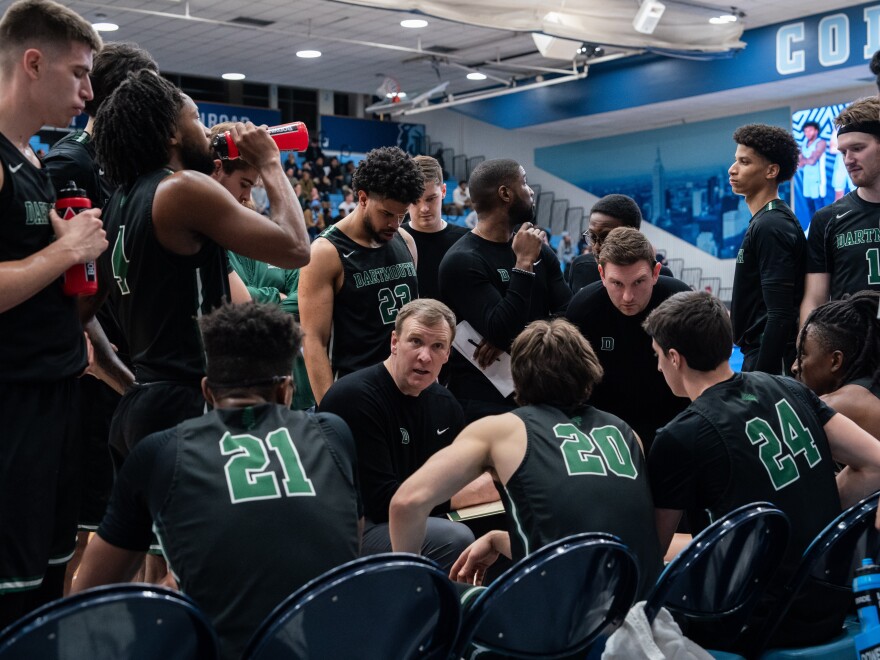Updated March 5, 2024 at 2:39 PM ET
Hours before their final game of the season, the Dartmouth men's basketball team has voted to join a union, becoming the first unionized college sports team in the U.S. and opening many thorny questions about the future of college sports.
Led by Dartmouth forward Cade Haskins and guard Romeo Myrthil, the 15 players announced their intent to unionize last September, arguing that the business of college sports is different that it was a few years ago. Tuesday's vote was 13 to 2 in favor of joining SEIU Local 560.
"Today is a big day for our team. We stuck together all season and won this election," wrote Haskins and Myrthil in a statement. "Let's work together to create a less exploitative business model for college sports."
The election was held over the objections of the Trustees of Dartmouth College, which last week filed a motion asking the National Labor Relations Board to halt the election pending further review. The NLRB denied that request.
On Tuesday, Dartmouth asked the NLRB to overturn the decision by the agency's regional director to hold the election in the first place, setting the stage for a protracted legal fight.
Are college athletes employees?
At the heart of this election was the issue of whether college athletes should be considered employees and therefore have to the right under federal labor law to form unions and collectively bargain over pay and benefits.
In the student newspaper, Haskins and Myrthil said they believe they should be compensated the same as other student employees. Being paid for the time they spend on the sport "would alleviate the need for second jobs and enhance our experience as part of the Dartmouth community," they wrote.
A union would also allow them to negotiate better health care benefits, to cover out-of-pocket costs incurred as a result of injuries sustained while playing for the school, the players argued.

In a ruling last month, NLRB regional director Laura Sacks concluded that an employer-employee relationship does exist between the Dartmouth basketball players and the college. She found that the players perform work that benefits their school through things like alumni donations and publicity, that the players are compensated for that work in nonmonetary ways, and that Dartmouth exercises a lot of control over that work. Her ruling paved the way for Tuesday's election.
Dartmouth vehemently disagrees. In motions filed last week, the school argued that the control it exerts over athletes is also common in other student activities and even in high school sports. Moreover, Dartmouth noted its basketball players have chosen to play the sport because they enjoy it, and that they could choose not to play since none of them receive athletic scholarships, which are banned in the Ivy League.
The school also pointed out that a majority of the team members are juniors and seniors.
"In three or fewer years, the entire team will be composed of Student-Athletes who had no part in these proceedings, and who had no voice in the election," the Trustees wrote in their motion.
Would unionized college athletes strike?
Unions often cite the ability to strike as their most powerful tool in contract negotiations. But Richard Paulsen, a sports economist at the University of Michigan, wonders when push comes to shove if college athletes would be willing to strike.
"These athletes love their sport. To give up one of those games or a month's worth of games during a limited career is something that I think some of these athletes would take pause with," Paulsen says.
Top athletes may be loathe to sacrifice opportunities to play before professional scouts, even if doing so could lead to gains for the bargaining unit.
There's also the question of how a college or university might react to a strike, Paulsen says. For schools that aren't generating a lot of revenue from their athletic programs — which is most of them — a strike may have negligible financial impact.

Beyond this, Paulsen sees huge complications in unionizing college athletes given the diversity of programs within college sports. There are over 1,000 NCAA institutions, and only a few are revenue-generating powerhouses.
There's also the question of how schools with unionized teams would comply with Title IX, the federal law requiring equal opportunity for men and women.
"These are big questions that are really all to be determined still," he says.
A slippery slope
Peter McDonough, general counsel for the American Council on Education, worries that the broader movement toward unionizing on college campuses puts the country on a slippery slope.
"I think we're at a real challenging place for what we've always presumed are core aspects of a college experience," he said in an interview before the Dartmouth vote.
A unionized college basketball team raises the question of what's next.
"Did we really imagine that a field hockey player and the coach are employee-employer? Do we want that to be the case?" says McDonough, who cautions that many schools may not be able to afford to pay their field hockey players.
"Do we want the field hockey team to no longer exist because it was never going to be revenue-positive even on its best day?"
Copyright 2024 NPR. To see more, visit https://www.npr.org.



